Abstract
Stochastic models of tumorigenesis have been developed to investigate the implications of experimental data on tumour induction in wild-type and p53-deficient mice for tumorigenesis mechanisms. Conventional multistage models in which inactivation of each p53 allele represents a distinct stage predict excessively large numbers of tumours in p53-deficient genotypes, allowing this category of model to be rejected. Multistage multipath models, in which a p53-mediated pathway co-exists with one or more p53-independent pathways, are consistent with the data, although these models require unknown pathways and do not enable age-specific curves of tumour appearance to be computed. An alternative model that fits the data is the 'multigate' model in which tumorigenesis results from a small number of gate-pass (enabling) events independently of p53 status. The role of p53 inactivation is as a rate modifier that accelerates the gate-pass events. This model implies that wild-type p53 acts as a 'caretaker' to maintain genetic uniformity in cell populations, and that p53 inactivation increases the probability of occurrence of a viable cellular mutant by a factor of about ten. The multigate model predicts a relationship between the time pattern of tumour occurrence and tumour genotype that should be experimentally testable. Stochastic modelling may help to distinguish 'gatekeeper' and 'caretaker' genes in other tumorigenic pathays.
Full text
PDF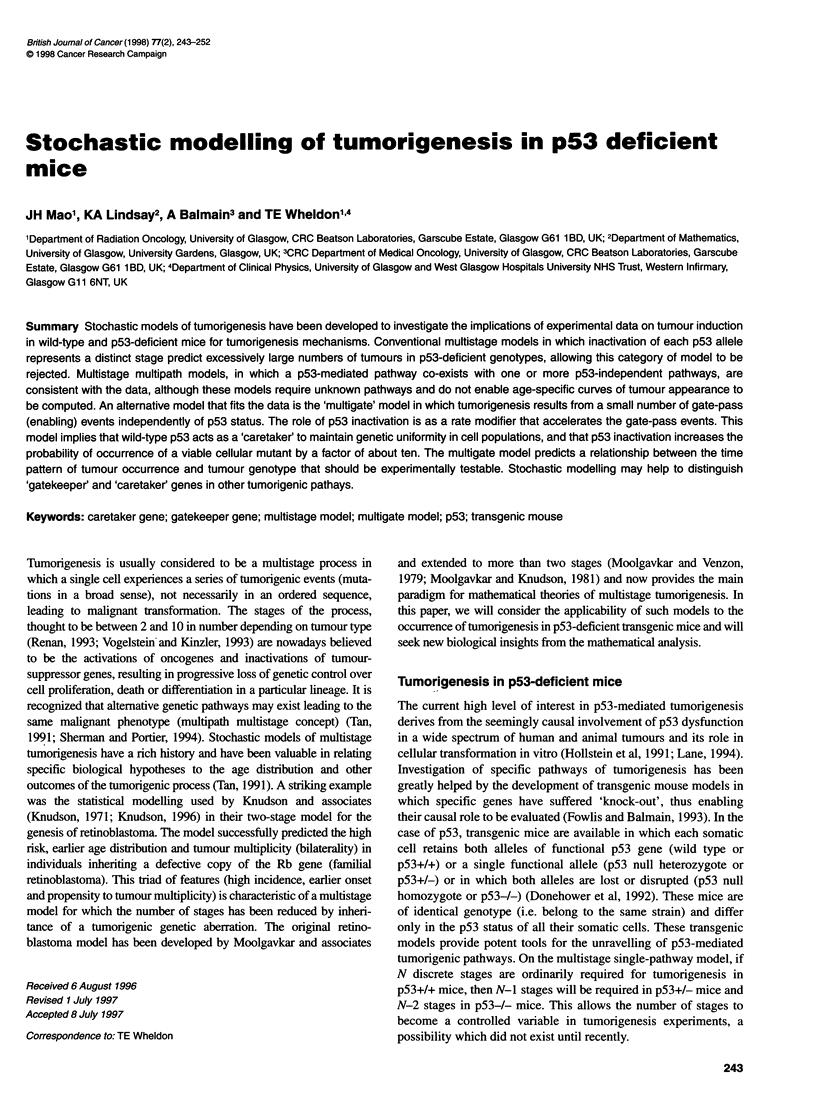
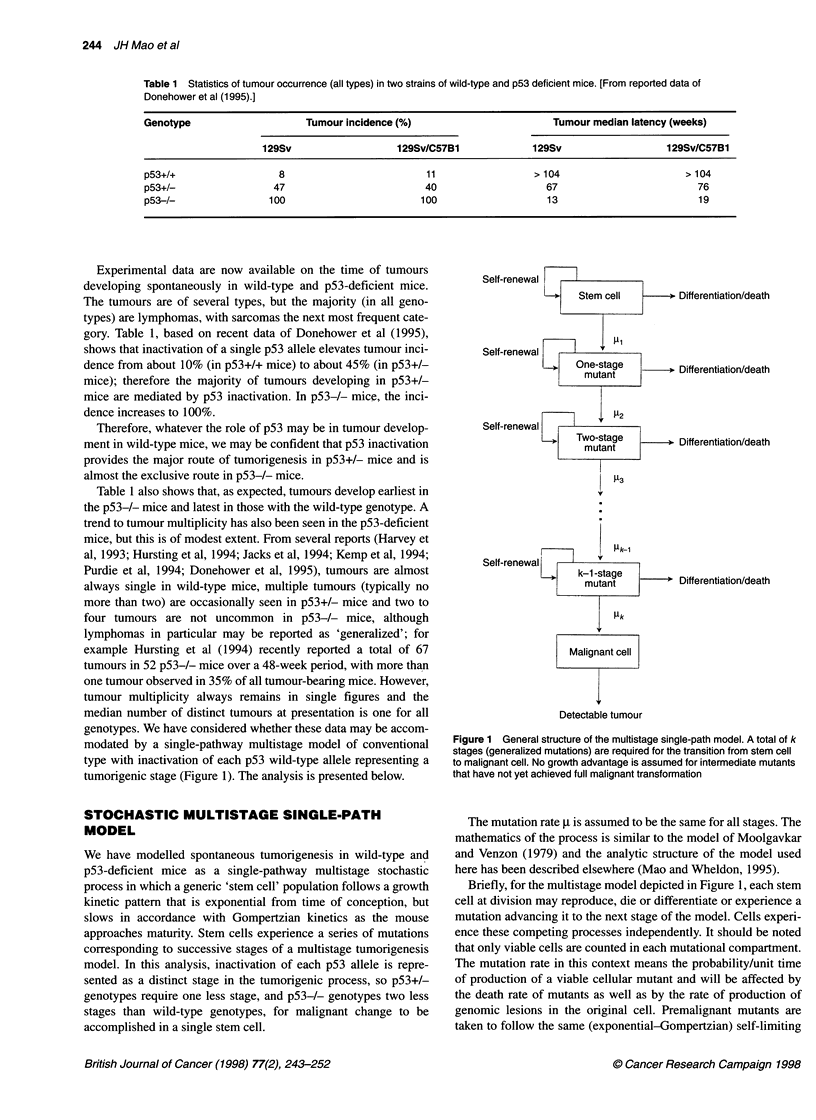
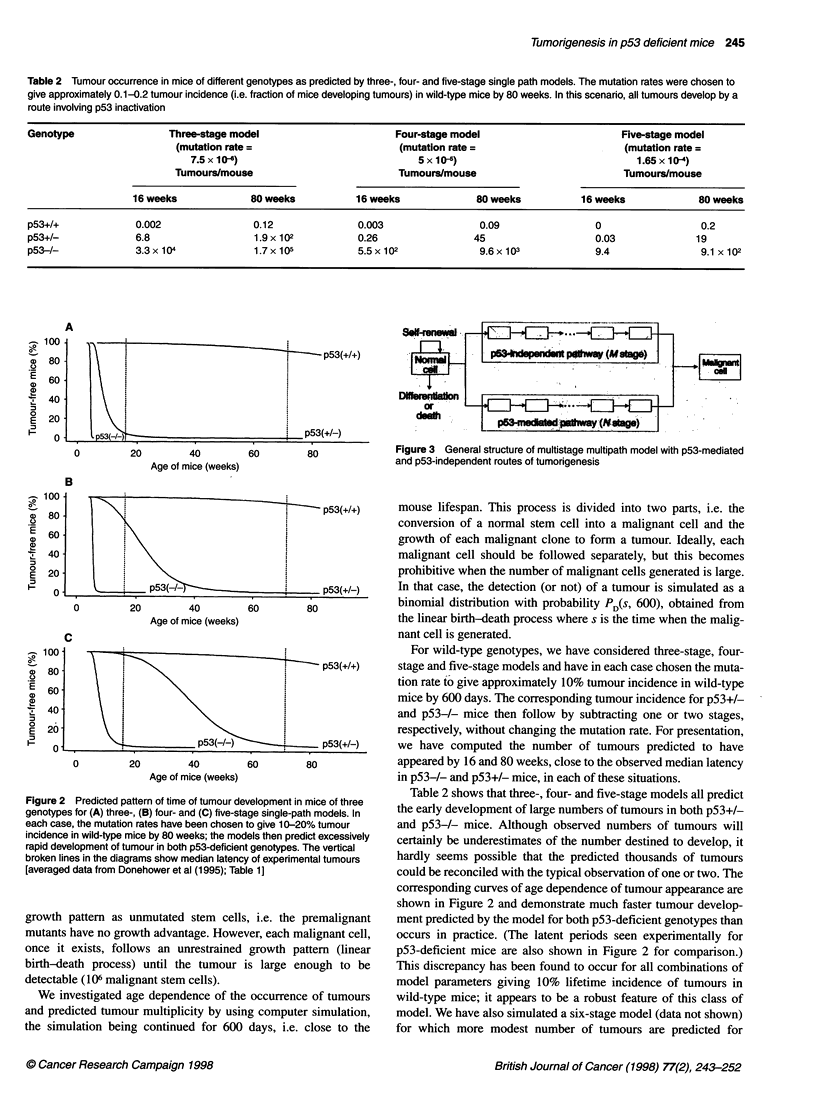
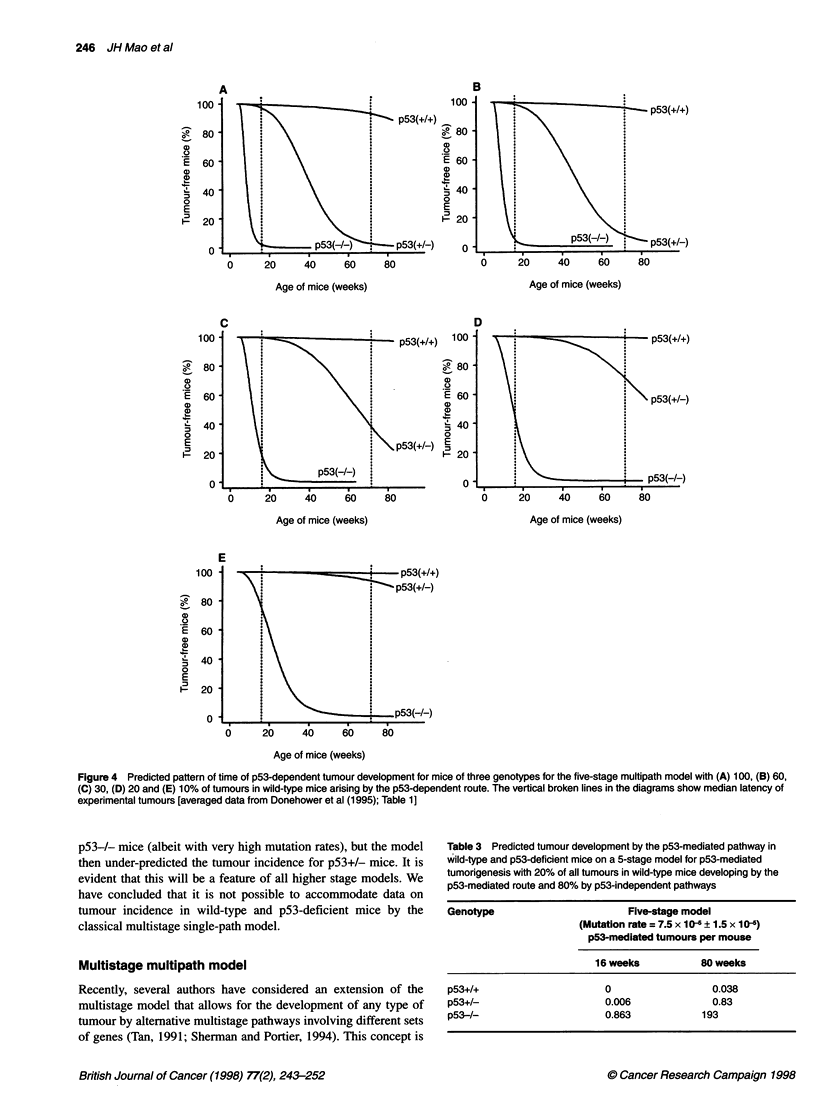
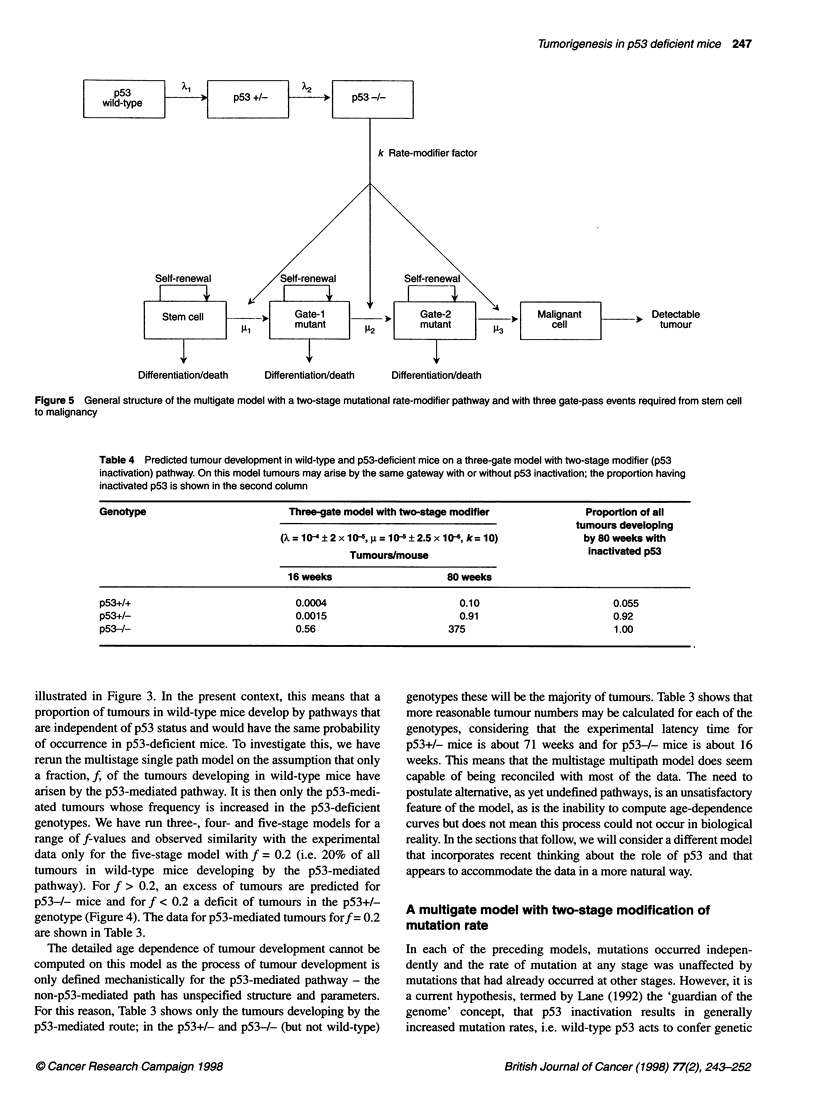
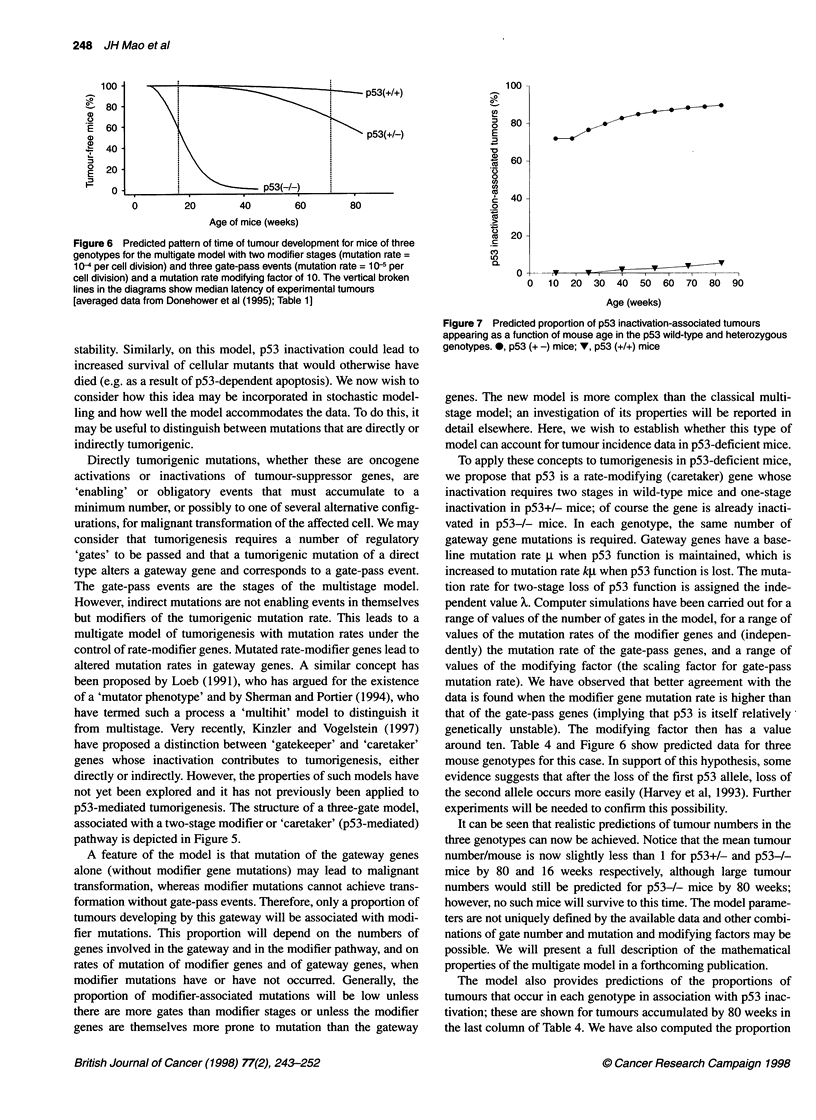
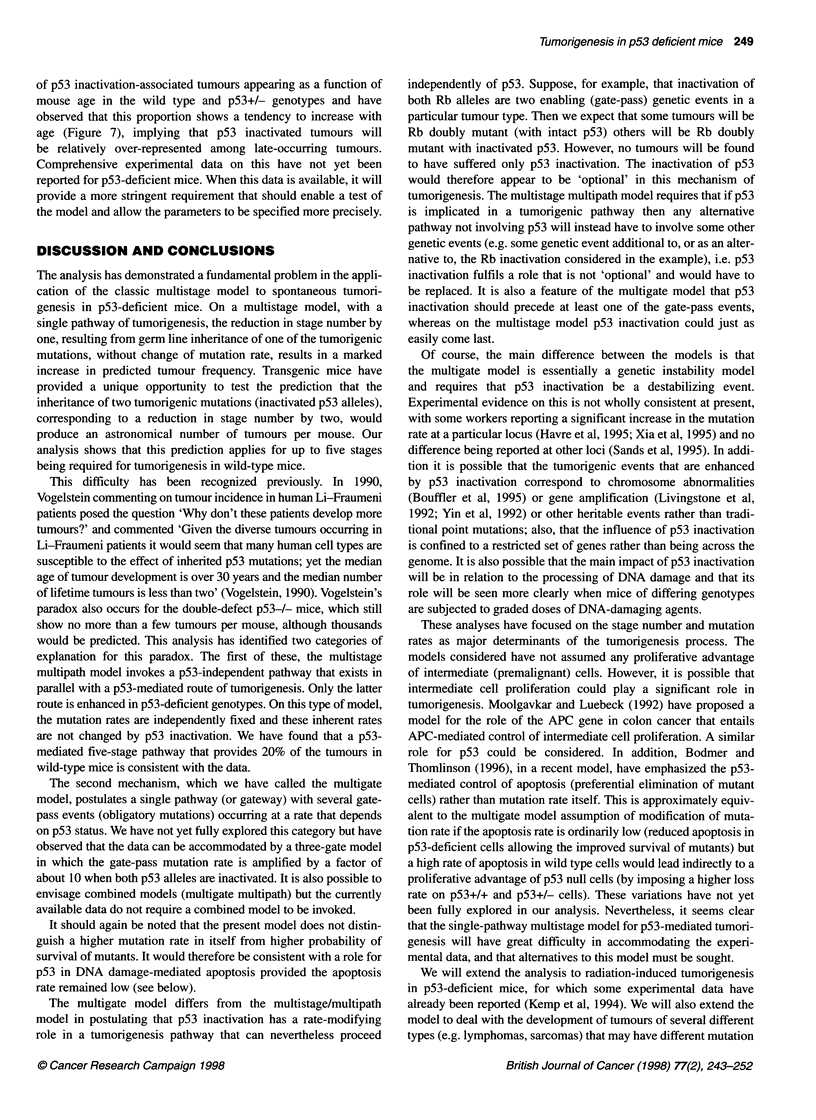
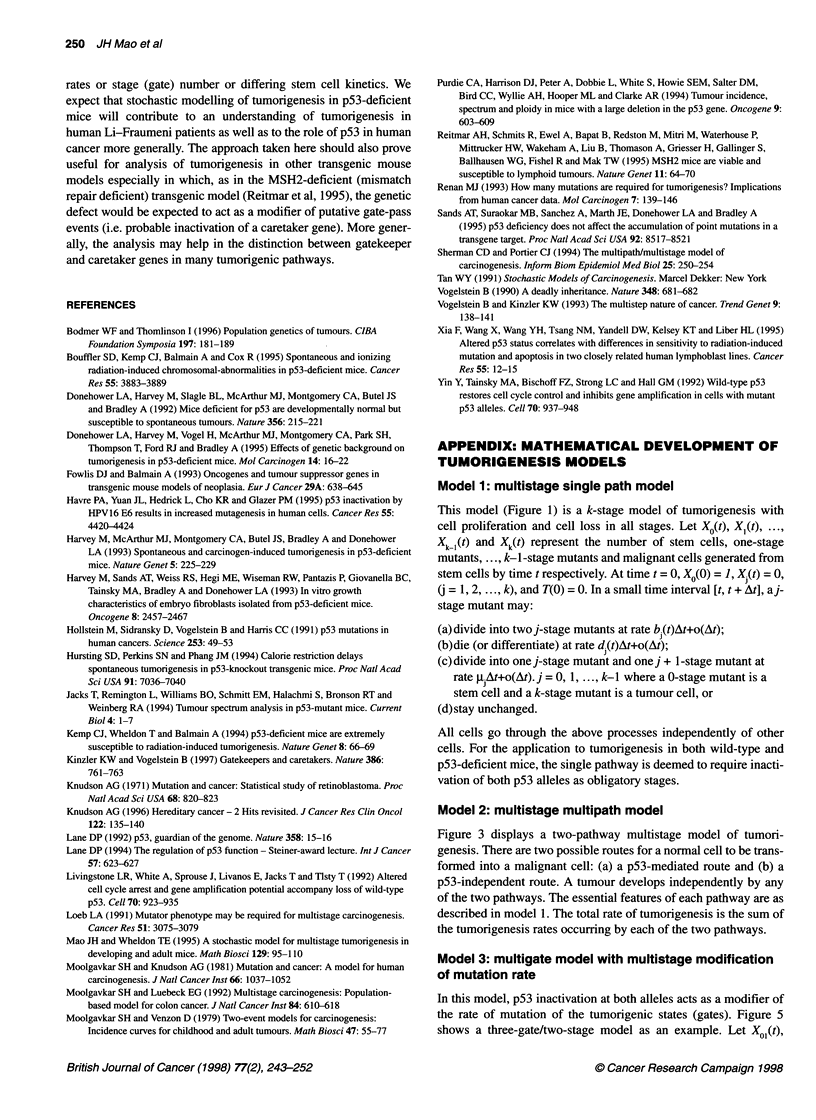
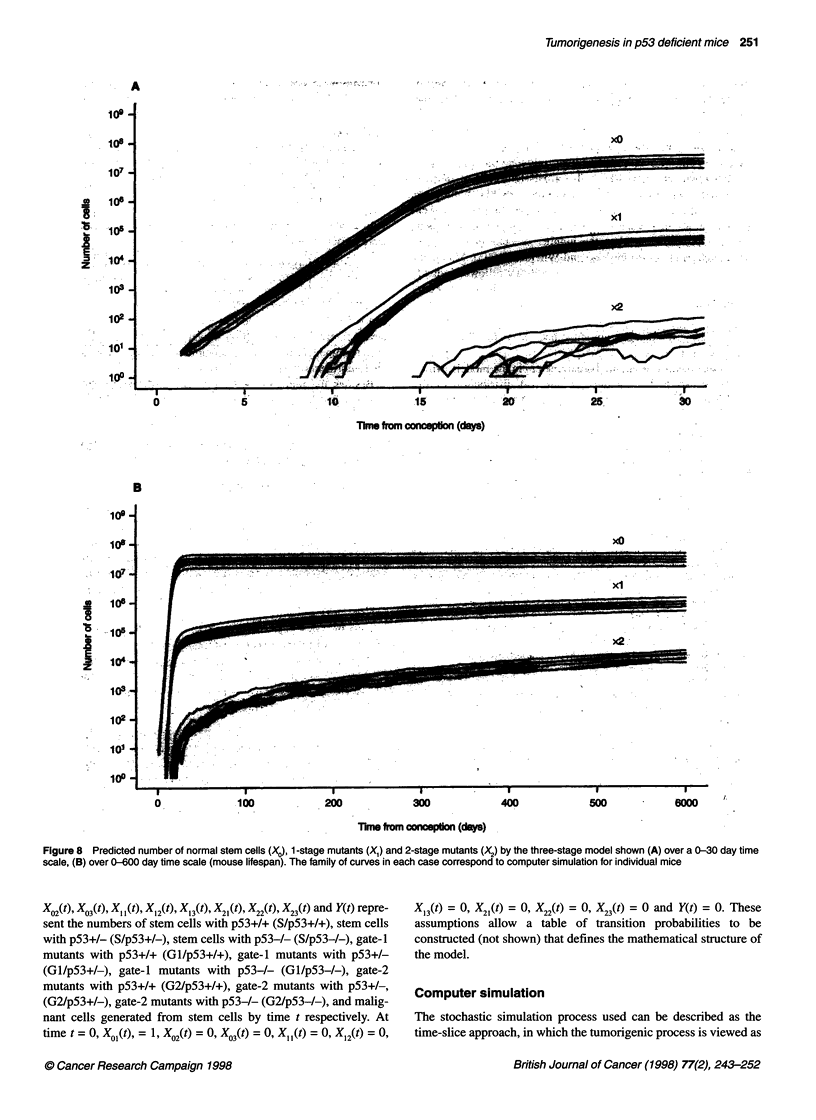
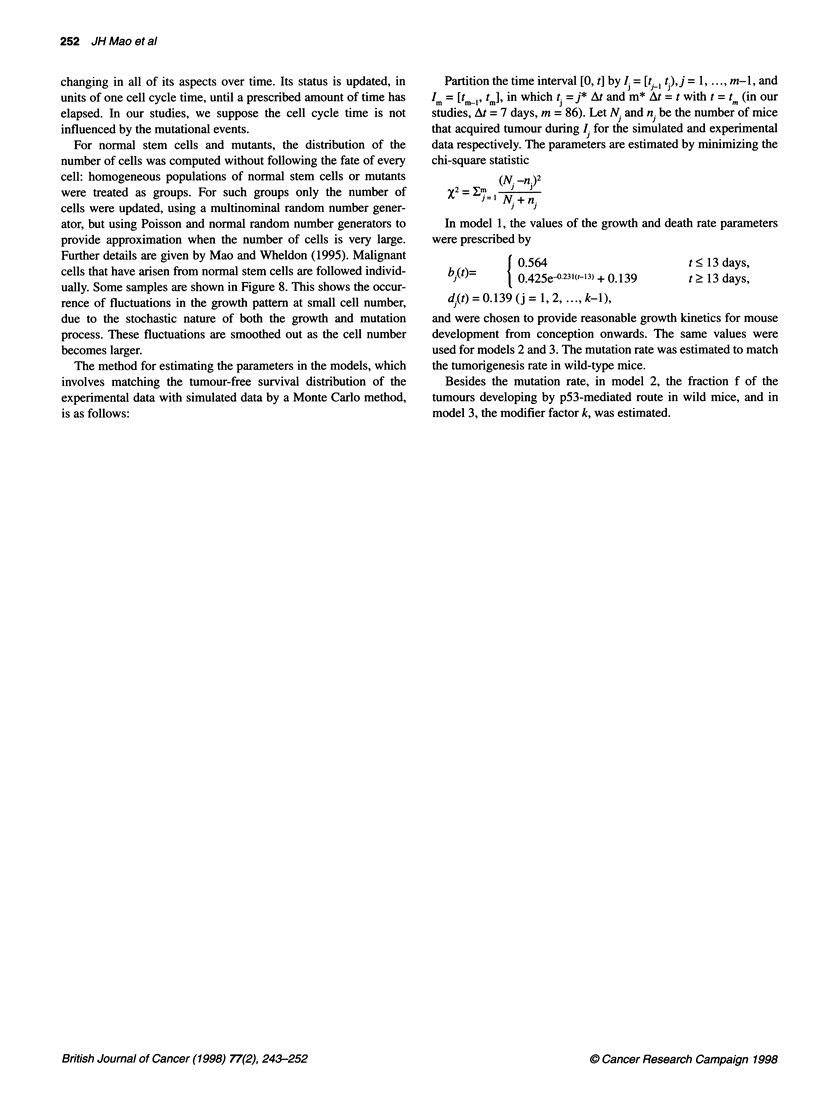
Selected References
These references are in PubMed. This may not be the complete list of references from this article.
- Bodmer W. F., Tomlinson I. Population genetics of tumours. Ciba Found Symp. 1996;197:181–193. doi: 10.1002/9780470514887.ch10. [DOI] [PubMed] [Google Scholar]
- Bouffler S. D., Kemp C. J., Balmain A., Cox R. Spontaneous and ionizing radiation-induced chromosomal abnormalities in p53-deficient mice. Cancer Res. 1995 Sep 1;55(17):3883–3889. [PubMed] [Google Scholar]
- Donehower L. A., Harvey M., Slagle B. L., McArthur M. J., Montgomery C. A., Jr, Butel J. S., Bradley A. Mice deficient for p53 are developmentally normal but susceptible to spontaneous tumours. Nature. 1992 Mar 19;356(6366):215–221. doi: 10.1038/356215a0. [DOI] [PubMed] [Google Scholar]
- Donehower L. A., Harvey M., Vogel H., McArthur M. J., Montgomery C. A., Jr, Park S. H., Thompson T., Ford R. J., Bradley A. Effects of genetic background on tumorigenesis in p53-deficient mice. Mol Carcinog. 1995 Sep;14(1):16–22. doi: 10.1002/mc.2940140105. [DOI] [PubMed] [Google Scholar]
- Fowlis D. J., Balmain A. Oncogenes and tumour suppressor genes in transgenic mouse models of neoplasia. Eur J Cancer. 1993;29A(4):638–645. doi: 10.1016/s0959-8049(05)80170-4. [DOI] [PubMed] [Google Scholar]
- Harvey M., McArthur M. J., Montgomery C. A., Jr, Butel J. S., Bradley A., Donehower L. A. Spontaneous and carcinogen-induced tumorigenesis in p53-deficient mice. Nat Genet. 1993 Nov;5(3):225–229. doi: 10.1038/ng1193-225. [DOI] [PubMed] [Google Scholar]
- Harvey M., Sands A. T., Weiss R. S., Hegi M. E., Wiseman R. W., Pantazis P., Giovanella B. C., Tainsky M. A., Bradley A., Donehower L. A. In vitro growth characteristics of embryo fibroblasts isolated from p53-deficient mice. Oncogene. 1993 Sep;8(9):2457–2467. [PubMed] [Google Scholar]
- Havre P. A., Yuan J., Hedrick L., Cho K. R., Glazer P. M. p53 inactivation by HPV16 E6 results in increased mutagenesis in human cells. Cancer Res. 1995 Oct 1;55(19):4420–4424. [PubMed] [Google Scholar]
- Hollstein M., Sidransky D., Vogelstein B., Harris C. C. p53 mutations in human cancers. Science. 1991 Jul 5;253(5015):49–53. doi: 10.1126/science.1905840. [DOI] [PubMed] [Google Scholar]
- Hursting S. D., Perkins S. N., Phang J. M. Calorie restriction delays spontaneous tumorigenesis in p53-knockout transgenic mice. Proc Natl Acad Sci U S A. 1994 Jul 19;91(15):7036–7040. doi: 10.1073/pnas.91.15.7036. [DOI] [PMC free article] [PubMed] [Google Scholar]
- Jacks T., Remington L., Williams B. O., Schmitt E. M., Halachmi S., Bronson R. T., Weinberg R. A. Tumor spectrum analysis in p53-mutant mice. Curr Biol. 1994 Jan 1;4(1):1–7. doi: 10.1016/s0960-9822(00)00002-6. [DOI] [PubMed] [Google Scholar]
- Kemp C. J., Wheldon T., Balmain A. p53-deficient mice are extremely susceptible to radiation-induced tumorigenesis. Nat Genet. 1994 Sep;8(1):66–69. doi: 10.1038/ng0994-66. [DOI] [PubMed] [Google Scholar]
- Kinzler K. W., Vogelstein B. Cancer-susceptibility genes. Gatekeepers and caretakers. Nature. 1997 Apr 24;386(6627):761–763. doi: 10.1038/386761a0. [DOI] [PubMed] [Google Scholar]
- Knudson A. G. Hereditary cancer: two hits revisited. J Cancer Res Clin Oncol. 1996;122(3):135–140. doi: 10.1007/BF01366952. [DOI] [PubMed] [Google Scholar]
- Knudson A. G., Jr Mutation and cancer: statistical study of retinoblastoma. Proc Natl Acad Sci U S A. 1971 Apr;68(4):820–823. doi: 10.1073/pnas.68.4.820. [DOI] [PMC free article] [PubMed] [Google Scholar]
- Lane D. P. Cancer. p53, guardian of the genome. Nature. 1992 Jul 2;358(6381):15–16. doi: 10.1038/358015a0. [DOI] [PubMed] [Google Scholar]
- Lane D. P. The regulation of p53 function: Steiner Award Lecture. Int J Cancer. 1994 Jun 1;57(5):623–627. doi: 10.1002/ijc.2910570502. [DOI] [PubMed] [Google Scholar]
- Livingstone L. R., White A., Sprouse J., Livanos E., Jacks T., Tlsty T. D. Altered cell cycle arrest and gene amplification potential accompany loss of wild-type p53. Cell. 1992 Sep 18;70(6):923–935. doi: 10.1016/0092-8674(92)90243-6. [DOI] [PubMed] [Google Scholar]
- Loeb L. A. Mutator phenotype may be required for multistage carcinogenesis. Cancer Res. 1991 Jun 15;51(12):3075–3079. [PubMed] [Google Scholar]
- Mao J. H., Wheldon T. E. A stochastic model for multistage tumorigenesis in developing and adult mice. Math Biosci. 1995 Oct;129(2):95–110. doi: 10.1016/0025-5564(94)00053-3. [DOI] [PubMed] [Google Scholar]
- Moolgavkar S. H., Knudson A. G., Jr Mutation and cancer: a model for human carcinogenesis. J Natl Cancer Inst. 1981 Jun;66(6):1037–1052. doi: 10.1093/jnci/66.6.1037. [DOI] [PubMed] [Google Scholar]
- Moolgavkar S. H., Luebeck E. G. Multistage carcinogenesis: population-based model for colon cancer. J Natl Cancer Inst. 1992 Apr 15;84(8):610–618. doi: 10.1093/jnci/84.8.610. [DOI] [PubMed] [Google Scholar]
- Purdie C. A., Harrison D. J., Peter A., Dobbie L., White S., Howie S. E., Salter D. M., Bird C. C., Wyllie A. H., Hooper M. L. Tumour incidence, spectrum and ploidy in mice with a large deletion in the p53 gene. Oncogene. 1994 Feb;9(2):603–609. [PubMed] [Google Scholar]
- Reitmair A. H., Schmits R., Ewel A., Bapat B., Redston M., Mitri A., Waterhouse P., Mittrücker H. W., Wakeham A., Liu B. MSH2 deficient mice are viable and susceptible to lymphoid tumours. Nat Genet. 1995 Sep;11(1):64–70. doi: 10.1038/ng0995-64. [DOI] [PubMed] [Google Scholar]
- Renan M. J. How many mutations are required for tumorigenesis? Implications from human cancer data. Mol Carcinog. 1993;7(3):139–146. doi: 10.1002/mc.2940070303. [DOI] [PubMed] [Google Scholar]
- Sands A. T., Suraokar M. B., Sanchez A., Marth J. E., Donehower L. A., Bradley A. p53 deficiency does not affect the accumulation of point mutations in a transgene target. Proc Natl Acad Sci U S A. 1995 Aug 29;92(18):8517–8521. doi: 10.1073/pnas.92.18.8517. [DOI] [PMC free article] [PubMed] [Google Scholar]
- Vogelstein B., Kinzler K. W. The multistep nature of cancer. Trends Genet. 1993 Apr;9(4):138–141. doi: 10.1016/0168-9525(93)90209-z. [DOI] [PubMed] [Google Scholar]
- Xia F., Wang X., Wang Y. H., Tsang N. M., Yandell D. W., Kelsey K. T., Liber H. L. Altered p53 status correlates with differences in sensitivity to radiation-induced mutation and apoptosis in two closely related human lymphoblast lines. Cancer Res. 1995 Jan 1;55(1):12–15. [PubMed] [Google Scholar]
- Yin Y., Tainsky M. A., Bischoff F. Z., Strong L. C., Wahl G. M. Wild-type p53 restores cell cycle control and inhibits gene amplification in cells with mutant p53 alleles. Cell. 1992 Sep 18;70(6):937–948. doi: 10.1016/0092-8674(92)90244-7. [DOI] [PubMed] [Google Scholar]


